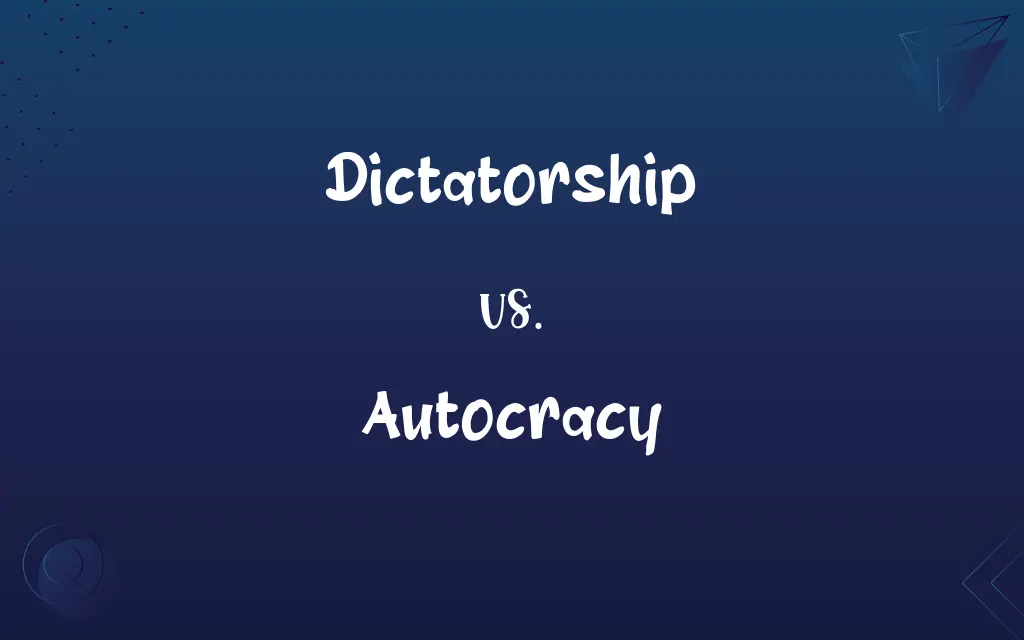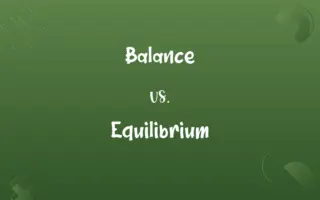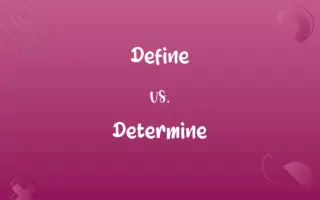Dictatorship vs. Autocracy: Know the Difference

By Shumaila Saeed || Updated on December 25, 2023
Dictatorship involves absolute rule by a single leader, often through coercion; autocracy is a system where power is concentrated in the hands of one individual, not necessarily oppressive.

Key Differences
Dictatorship is characterized by the absolute rule of a single leader, often seizing power through force or manipulation. Autocracy, while also centralized in one individual, doesn't inherently imply the same level of oppression or forceful control. Both forms concentrate power but differ in their methods and public perception.
Shumaila Saeed
Dec 05, 2023
In a dictatorship, the ruler's authority often stems from fear and suppression of opposition. Conversely, an autocracy can exist with some level of public support or traditional legitimacy, focusing on the concentration of power rather than the means of maintaining it. Both systems lack democratic processes but vary in their basis of rule.
Shumaila Saeed
Dec 05, 2023
Dictatorships often involve a cult of personality, where the dictator is glorified. Autocracies might not exhibit this trait, as the autocrat's power can be more institutional than personal. Both, however, feature limited political freedoms and centralized decision-making.
Shumaila Saeed
Dec 05, 2023
The transition of power in dictatorships is often unstable, sometimes leading to violent succession conflicts. Autocracies may have more structured succession plans, sometimes within a family or dynasty. Both systems, however, struggle with the issue of succession due to the concentration of power in one individual.
Shumaila Saeed
Dec 05, 2023
In dictatorships, censorship and propaganda are common tools to maintain control. Autocracies might also use these methods, but their use is not as inherently linked to the system as in dictatorships. Both government forms restrict information flow, but the intensity and method can vary.
Shumaila Saeed
Dec 05, 2023
ADVERTISEMENT
Comparison Chart
Basis of Power
Often through force, coercion, or manipulation
Can be traditional, institutional, or personal
Shumaila Saeed
Dec 05, 2023
Public Perception
Generally negative, associated with oppression
Can be neutral or even positive, depending on legitimacy
Shumaila Saeed
Dec 05, 2023
Succession
Often unstable, prone to conflicts
May have structured plans, sometimes within a family or dynasty
Shumaila Saeed
Dec 05, 2023
Use of Propaganda
Common and integral for control
Used but not always central to governance
Shumaila Saeed
Dec 05, 2023
Leadership Style
Often involves a cult of personality
More institutional, may not focus on individual glorification
Shumaila Saeed
Dec 05, 2023
ADVERTISEMENT
Dictatorship and Autocracy Definitions
Dictatorship
Government by a ruler with total control.
Under his dictatorship, freedom of speech was nonexistent.
Shumaila Saeed
Dec 05, 2023
Autocracy
Rule by an individual with complete control, often hereditary.
The autocracy was sustained through a lineage of kings.
Shumaila Saeed
Dec 05, 2023
Dictatorship
A regime where one person makes all the decisions.
The country's dictatorship was marked by the leader's arbitrary decisions.
Shumaila Saeed
Dec 05, 2023
Autocracy
A system where all power is held by one individual.
The autocracy centralized decision-making in the hands of the monarch.
Shumaila Saeed
Dec 05, 2023
Dictatorship
A system where a single leader has absolute power, often taken by force.
The military dictatorship overthrew the previous democratic government.
Shumaila Saeed
Dec 05, 2023
ADVERTISEMENT
Autocracy
Government by a single person with absolute power.
In an autocracy, the ruler's word is law.
Shumaila Saeed
Dec 05, 2023
Dictatorship
Rule by a leader who exercises complete authority.
His dictatorship was characterized by strict censorship and surveillance.
Shumaila Saeed
Dec 05, 2023
Autocracy
Government in which one person possesses unlimited power.
Under the autocracy, new laws were enacted without public consultation.
Shumaila Saeed
Dec 05, 2023
Dictatorship
Government where power is concentrated in the hands of one individual.
During the dictatorship, all opposition parties were banned.
Shumaila Saeed
Dec 05, 2023
Autocracy
A country or state that is governed by a single person with unlimited power.
Shumaila Saeed
Oct 19, 2023
Autocracy
(uncountable) A form of government in which unlimited power is held by a single individual.
Shumaila Saeed
Oct 19, 2023
Dictatorship
A type of government where absolute sovereignty is allotted to an individual or a small clique.
Shumaila Saeed
Oct 19, 2023
Autocracy
Independent or self-derived power; absolute or controlling authority; supremacy.
The divine will moves, not by the external impulse or inclination of objects, but determines itself by an absolute autocracy.
Shumaila Saeed
Oct 19, 2023
Autocracy
Supreme, uncontrolled, unlimited authority, or right of governing in a single person, as of an autocrat.
Shumaila Saeed
Oct 19, 2023
Dictatorship
Any household, institution, or other organization that is run under such sovereignty or autocracy.
Shumaila Saeed
Oct 19, 2023
Autocracy
Political independence or absolute sovereignty (of a state); autonomy.
Shumaila Saeed
Oct 19, 2023
Dictatorship
The office, or the term of office, of a dictator; hence, absolute power.
Shumaila Saeed
Oct 19, 2023
Autocracy
The action of the vital principle, or of the instinctive powers, toward the preservation of the individual; also, the vital principle.
Shumaila Saeed
Oct 19, 2023
Dictatorship
A form of government in which the ruler is an absolute dictator (not restricted by a constitution or laws or opposition etc.)
Shumaila Saeed
Oct 19, 2023
Autocracy
A political theory favoring unlimited authority by a single individual
Shumaila Saeed
Oct 19, 2023
Autocracy
A form of government where one person exercises authority.
The country's autocracy limited political pluralism and dissent.
Shumaila Saeed
Dec 05, 2023
Repeatedly Asked Queries
Is succession stable in dictatorships?
Succession in dictatorships is often unstable and can lead to conflicts.
Shumaila Saeed
Dec 05, 2023
What defines a dictatorship?
A dictatorship is defined by absolute rule by a single leader, often through coercive means.
Shumaila Saeed
Dec 05, 2023
Are dictatorships always oppressive?
While not always, dictatorships typically involve oppression and suppression of dissent.
Shumaila Saeed
Dec 05, 2023
Are dictatorships and autocracies mutually exclusive?
No, a dictatorship can be a form of autocracy, but not all autocracies are dictatorships.
Shumaila Saeed
Dec 05, 2023
Can autocracies be legitimate?
Yes, autocracies can have legitimacy, either through tradition, institutional means, or personal popularity.
Shumaila Saeed
Dec 05, 2023
Can autocracies have public support?
Yes, autocracies can enjoy public support, especially if the ruler is seen as legitimate.
Shumaila Saeed
Dec 05, 2023
Can an autocrat be a benevolent ruler?
Yes, some autocrats may rule benevolently, though power is still concentrated in their hands.
Shumaila Saeed
Dec 05, 2023
Are dictatorships always ruled by a single person?
Generally, yes, dictatorships are ruled by one individual.
Shumaila Saeed
Dec 05, 2023
Can a democracy become a dictatorship?
Yes, democracies can transform into dictatorships, often through gradual erosion of freedoms.
Shumaila Saeed
Dec 05, 2023
Do autocracies allow for political pluralism?
Generally, autocracies have limited political pluralism.
Shumaila Saeed
Dec 05, 2023
Are dictatorships economically successful?
Economic success in dictatorships varies and is not guaranteed.
Shumaila Saeed
Dec 05, 2023
Do autocracies always suppress opposition?
While common, not all autocracies actively suppress opposition.
Shumaila Saeed
Dec 05, 2023
Can an autocracy be stable?
Yes, autocracies can be stable, especially if there is a clear succession plan or public support.
Shumaila Saeed
Dec 05, 2023
Do autocracies always involve a hereditary transfer of power?
Not always; while some autocracies are hereditary, others may not be.
Shumaila Saeed
Dec 05, 2023
Do dictatorships allow free media?
Typically, dictatorships restrict media freedom to control information and public opinion.
Shumaila Saeed
Dec 05, 2023
Are all dictatorships military-based?
No, not all dictatorships are military-based; some may arise from civilian leaders.
Shumaila Saeed
Dec 05, 2023
Can an autocracy have a legal framework?
Yes, autocracies can have legal frameworks, but these are often controlled by the autocrat.
Shumaila Saeed
Dec 05, 2023
Can autocracies evolve into democracies?
Yes, autocracies can transition into democracies, often through reforms or revolutions.
Shumaila Saeed
Dec 05, 2023
Are dictatorships legal?
Legality varies; in some contexts, dictatorships may be considered legitimate, while in others, they are illegal.
Shumaila Saeed
Dec 05, 2023
How do dictatorships maintain power?
Dictatorships often maintain power through fear, coercion, and control of resources.
Shumaila Saeed
Dec 05, 2023
Share this page
Link for your blog / website
HTML
Link to share via messenger
About Author
Written by
Shumaila SaeedShumaila Saeed, an expert content creator with 6 years of experience, specializes in distilling complex topics into easily digestible comparisons, shining a light on the nuances that both inform and educate readers with clarity and accuracy.









































































